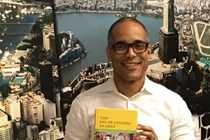Notes From Rio
April 08, 2016

Historian Daryle Williams discusses his new book "The Rio de Janeiro Reader," sharing his insights on the upcoming Olympics.
Written by Gabriela Martínez
As Rio de Janeiro prepares to host the 2016 Summer Olympics and Paralympics, media outlets have turned their focus to the city’s numerous health and economic issues. Meanwhile, the Brazilian and international Olympic committees keep looking forward, assuring that “everything will be fine.”
Daryle Williams, associate professor of history and scholar of Brazilian history at the University of Maryland, recently published “The Rio de Janeiro Reader: History, Culture and Politics,” which he coedited along with Amy Chazkel and Paulo Knauss. The book explores the new aspects in Rio’s old façade, as well as the old in the new, Williams notes.
“The Rio Reader" belongs to Duke University’s “World Readers” series, which are books that serve as in-depth profiles of cities and countries around the world. Following the thoroughness of “reader” format, “The Rio Reader” provides deep insight into the history, politics, culture, geography and people of Rio de Janeiro, from the colonial era to the city’s transformation into a global city. Aside from highlighting the important events in Rio’s historical development, the text “increases the understanding of culture in everyday life.” By using a diverse set of primary sources, such as state-issued documents, songs and art pieces, the book strives to share the multiple narratives that make up Rio’s rich history, which can be seen through the city’s carnaval traditions and dances such as capoeira.
At the same time, the book serves as an in-depth guide to the city’s geography and cultural landmarks.
For Rio, the 2016 Olympic Games promise to be a set of dazzling spectacles that reveal the city’s status as a global hub as well as Brazil’s vibrant culture and spirit.
“The Olympics bid and the Olympics moment are really about this spectacular, beautiful, kind of wondrous city—a modern city, but in the tropics,” said Williams. “Incredibly vibrant, creative and innovative, multiethnic people who, despite all the different challenges of the tropics like underdevelopment, make their way, and make their way spectacularly—with flair.”
At the same time, the city is experiencing political scandals related to corruption, economic turmoil, and more recently, the fear of the mosquito-borne Zika virus.
While Williams is optimistic about the Olympic Games and sees the beauty of Rio beyond the Olympics propaganda, he recognizes that there are some major socio-economic injustices tied to the games' development goals. One of the main issues is the displacement of the city’s citizens, he said.
“In major world events such as this, there isn’t just physical beautification of the city—but also a lot of displacement,” Williams said. “People who have legal rights to work or live in certain areas have those rights suspended or stripped away because of development and city cleanup.”
One of the most documented cases of displacement is that of Vila Autódromo, a low-income neighborhood, known as a “favela” in Portuguese. The neighborhood was torn down in order to make space for the Olympic Village. Though only a small fraction of favela residents have been displaced during the Olympics construction phase, favelas often carry a stigma that enables unfair housing policies, according to an article in The Conversation.
The government of Rio has spent millions on the Olympics and expects to exceed its budget. Despite doubts regarding the feasibility of a metro extension project, the city recently announced that the new line will be ready in about four months. Line 4 runs from Ipanema, in the Zona Sul (South Zone), to Barra da Tijuca and was proposed as an effective means of transportation for tourists going to different sports events, as well as a solution to the city’s traffic issues.
Williams has his own relationship to the city, one that developed through his scholarly work and firsthand experience with the culture. Growing up on the U.S.-Mexico border, Williams developed an affinity to Latin America at an early age. As an undergraduate student, Williams had the opportunity to take intensive Brazilian Portuguese classes during the summer between his sophomore and junior years. There, he met an instrumental language professor— a native from Rio— who inspired him to learn more about the city’s multi-faceted history and culture, and encouraged him to travel to Rio for his senior thesis.
Williams recently traveled to Brazil to promote “The Rio Reader” and work on his current research project on Africans and freedom during the suppression of the transatlantic slave trade. For this project, Williams is examining 19th-century documents related to slave trade, which he accessed through the Brazilian and British national archives. Some of these government documents are petitions, letters and requests from liberated Africans known as “emancipados,” a Portuguese word meaning “emancipated.”
An athlete himself, Williams is looking forward to the triathlon competitions at the Olympics, which he will be attending in August. Williams did his first triathlon in Rio in 2012, swimming in the Guanabara Bay—“notoriously polluted,” Williams added—biking along an elevated freeway formerly known as the Elevado da Perimetral before it was demolished as part the urbanization plans of Port Maravilha, the city’s downtown port region.

